In 1451, there was no digital music.
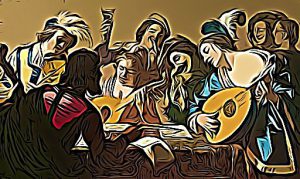
The iPod? It was just a gleam in your
great-great…
great-great…
great-great…
great-great…
GREAT-GREAT…
Grandfather’s eye!
But there were live concerts, with real people, playing real instruments. The music then, in what is considered the early Renaissance era, hadn’t really changed that much, rather it had just skipped along as it had for medieval centuries.
But there was something that DID annihilate the status quo that year. The printing press.
Some contend (and rightly so, I think) that the printing press was the most influential technological breakthrough of the modern age. It changed SO many things in SO many ways, and improved life and human understanding on so many levels, that we are still feeling its effects to this day.
But there was a downside.
Up to that point, the Catholic Church had basically been THE dispenser of knowledge for the masses in many places around the globe. It copied all the texts, it owned those texts, and it was the one to read those texts to an audience in the millions. For each one of those three transmissions there was a charge incurred (even tho’ the tithe was technically considered voluntary it was still expected!), and that put lots of money into the coffers of the Church.
With the advent of the printing press, however, there was a sudden, dramatic and unforeseen cutoff of that lucrative flow. The cash cow had been chopped to bits, and then made into a lovely stew… that the Protestant Reformation slurped up gladly!
So what’s the lesson here? Well, nobody likes it when they’re livelihood is taken away. It hurts. It’s not fair. It sucks. But it’s gonna happen. In fact, for musicians, it’s happening…
right…
now.
The Song Does Not Remain the Same
If you didn’t catch my look back at 2017 and the huge changes that continued to rear their ugly heads in our industry, go read it HERE. Suffice it to say, the level of actual music sales continued to go down, as they have for years now.

Instead, music streaming sites are taking over. People love their “one-stop-shop’ approach to listening to music. Whatever you want to hear, it’s there. Like a certain album? You’re probably going to find it on Spotify. Want to explore other albums you never purchased but always wondered about? Go nuts – they’re right there waiting to satiate your curiosity.
My wife subscribed to Spotify last year, and automatically subscribed me too. Do I like the platform? Absolutely! Love it! I can listen to albums by artists I’ve never heard of and see if I want to support them. I can demo the albums by favorite artists that I did not buy, to see if they’re worth it. And with it all being so instantaneous and accessible all in one place? Well, that makes it even more convenient than my iPod, which got put into storage last year soon after.
But I’m also a performing songwriter. And I know how much Spotify pays per play. Do you? It appears to change every month, but the latest stats I found were from early 2017. They showed the payout to be 0.0004 cents per stream.
That’s abominable. And it’s getting worse: the numbers garnered from Spotify, which are required under Sec 115 of US copyright law, show that as Spotify’s value and revenues have gone up, artists and publishers have in tandem made less.
January 27th, however, did nudge us ever so slightly in the right direction: The Copyright Royalty Board (CRB) that determines rates and terms for copyright licenses, and the royalties associated with them, ruled that musicians are not paid enough from all these streaming services. Their ruling now demands that the payout rate for artists and their music be raised from a 10.5% up to a 15.1% portion of all profits. Not only that, but they also put in as part of the ruling that the streaming sites will be financially penalized if they pay artists and publishers late.
Now that’s a step in the right direction!
But clearly, none of us will buying our first Lamborghini anytime soon with these pay-outs. So we’ve gotta take other steps to safeguard our income and musical legacies.
But before we look at that, let’s see how we got here…
Ample Lifts From Samplers
The first major rumblings of musical communism surged through in the 80s. And wouldn’t ya know it, it all coincided with the release of a new kind of music gear called “samplers‘. With a sampler under hand, anyone could nick any bit of a recorded song and play it as a loop for their own recordings. Hundreds did just that. Roger Linn, of Linn Drum fame put it this way:
“I noticed that people were starting to sample big chunks of other people’s records. I thought it was odd that they were using a machine that should be used for drums and just looping a segment, you know, basically standing on the shoulders of giants.”
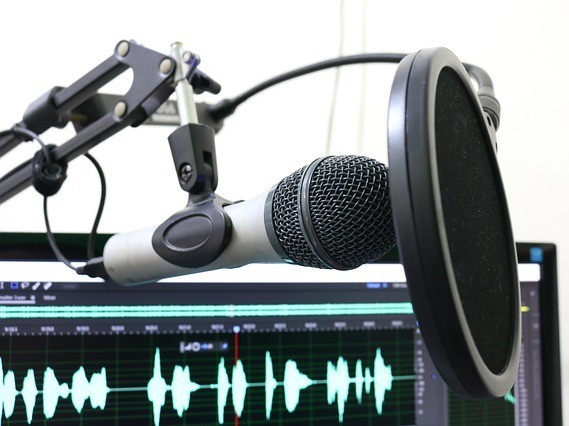
This continued for a couple years, but soon the original creators of the sampled pieces of music began seeking litigation to stop this theft, basically, from happening. Rules were changed and soon enough there were charges if you wanted to use a sample from someone else’s music.
But the masses had shown their cards – they wanted “free”. Free is nice. Free is good.
Except, of course, for the unpaid person who composed the music in the first place.
I was just watching Hall & Oates in a video today and the interviewer asked them how they feel about the dozens of times their song “No Can Do” has been sampled. They responded positively by saying that we are all inspired by other artists, and it’s okay to try to emulate them, but there’s a line between that and just outright sampling someone else’s work, changing something about it, and calling it your own.
I’d have to agree.
Cut the Crap, Sir, ’bout Napster
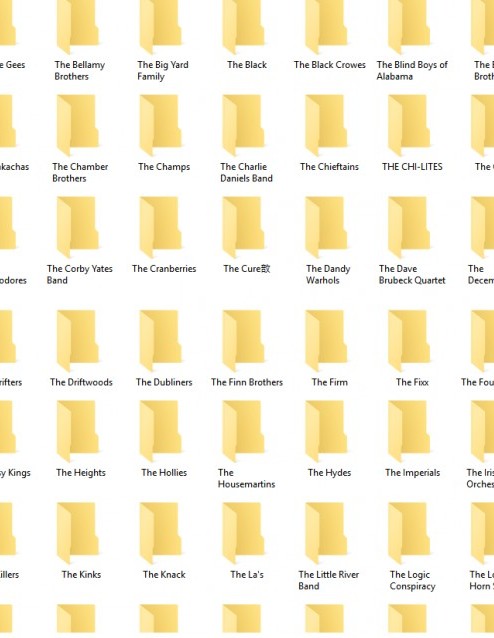
June 1, 1999. A little start-up website called Napster comes online. It’s technology’s premise: allow all computer users to exchange, give or simply take any digital audio files, uploaded from CDs, from each other via the Internet.
I remember jumping on to see what the fuss was about. I tried it myself. I even thought it was cool at first. My favorite part was finding recordings I couldn’t buy ‘cuz they’d gone out of print years ago. Getting to hear songs I could only listen to in my memory before definitely got me stoked.
For example, I actually found “Shaving Cream” by Benny Bell, which I hadn’t heard since I was a kid. To my surprise, the song suddenly had a hilarious new meaning that, as a child, went RIGHT OVER my head. Listen to it and I think you’ll see the part I mean! lol
But then I started to see through to the monster we’d created. We didn’t realize it then, but we were all witnessing a sort of musical communism. The masses, suddenly rising up in droves to nab tons of totally free albums, were unwittingly tearing down the very infrastructure of the music business, like amped-up protesters pulling down statues of some despised dictator.
Once I saw that, I deleted the program and never looked back.
By and large, machine innovations have tended to raise the fortunes of most nation states eventually on their rising tides of technological progress. That’s a good thing.
But every time something new is created, something old is made obsolete. Once Napster allowed face-less, nameless invited hackers to share any and all music ever created, the impact on music sales were immediate… and dreadful. Music creators everywhere took the hit. The insatiable cat was definitely out of the bag, and it’s hissing is easily still heard today around the world.
Ghosts (Players) in the Machine
I just completed a new song. I had a blast, as always. I played bass, keys, guitar and percussion, and really like how it has come out.
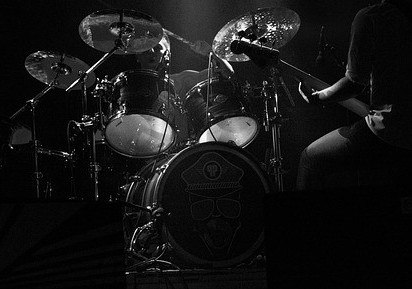
I did not, however, play the drums.
Who did? Why, Omar Hakim, of course.
If you don’t know, Omar is one of the best of the best, and certainly one of my favorite skin-beaters of all time. He’s been hugely famous for decades because of his adept technical skill and consistent feel. Don’t believe me? Check him out with Sting HERE!
But he doesn’t live in Detroit. And I don’t feel like doling out a lot of cash to him for just a few video background music tracks.
So what did I do? I bought the Omar Hakim Drum Loops from the LoopLoft. They are copyright-cleared, 100% royalty-free, immediately ready, and superbly recorded, with each part of the drum separately tracked for maximum control.
Now, whenever I want, I can summon up Omar’s ghost that resides in my “box”, and bid him come and haunt my latest tracks with his percussive prowess. When I’m satisfied with my choices of his choices, he fades into the byte-bed background of my computer until summoned to rise again.
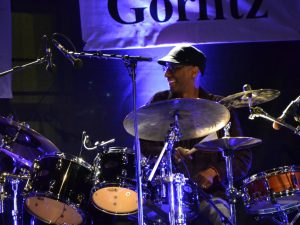
Oh, and, yea, I can tell you how cool it is, hearing a hero’s playing coming through on MY monitors on MY song, and how it left me smiling the whole day, but until you experience it for yourself… you just can’t know!
Despite my joy thought, it makes me think: doesn’t this negatively impact Omar’s ability to make a living off of his skills now? Why pay him the big bucks when you can just have his playing at the click of a drumstick for less than $20?
He chose to do it, true, but I see his product, and hundreds of products like it by other skilled players, as further proof of the erosion of the typical means for musicians to earn a living.
Here’s other evidences:
- Laptops hold all the virtual instruments you need.
- The genres that use virtual instruments the most, EDM & Rap, are claiming more and more real estate on the Billboard charts.
- The legendary guitar manufacturer Gibson is now facing bankruptcy, after trying to defend itself against a decade-long plunge in guitar sales, due mostly to virtual instruments becoming the sale of choice.
- Almost all of my musician friends who still sell CDs, play out locally and upload videos of their live work, are getting close to zero recompense for all their efforts.
- Ticket prices. Have you noticed that they are higher than they’ve ever been? It’s one of the few tools artists have left to try to compensate for the still-plunging decline in music sales.
Play the Machine, or the Machine Plays You
All of the above might sound like complaining. It’s not. Just the opposite, actually – I think this may be the most exciting time to be a musician in history. The tools at our disposal are just astounding in the light of the little we had even 20 years ago.
But this word must get out: we absolutely cannot go about business as usual. Our industry is in a time of upheaval, and if we don’t adapt to what the juggernaut machine is steamrolling over us, we will certainly not thrive. Or even survive, in some cases.
So… what’s to be done?
We must develop new ways of generating income and marketing our music, and really take a good look at also marketing ourselves. We must not just roll with the changes – we must implement our own.
Consider this: according to the “World Economic Forum Annual Meeting” which took place at the end of last month, there are four key “superpowers” that the world is embracing at record speeds that will continue to reshape our methods and instruments of communication, learning, and daily interaction for decades, if not centuries, to come. They are:
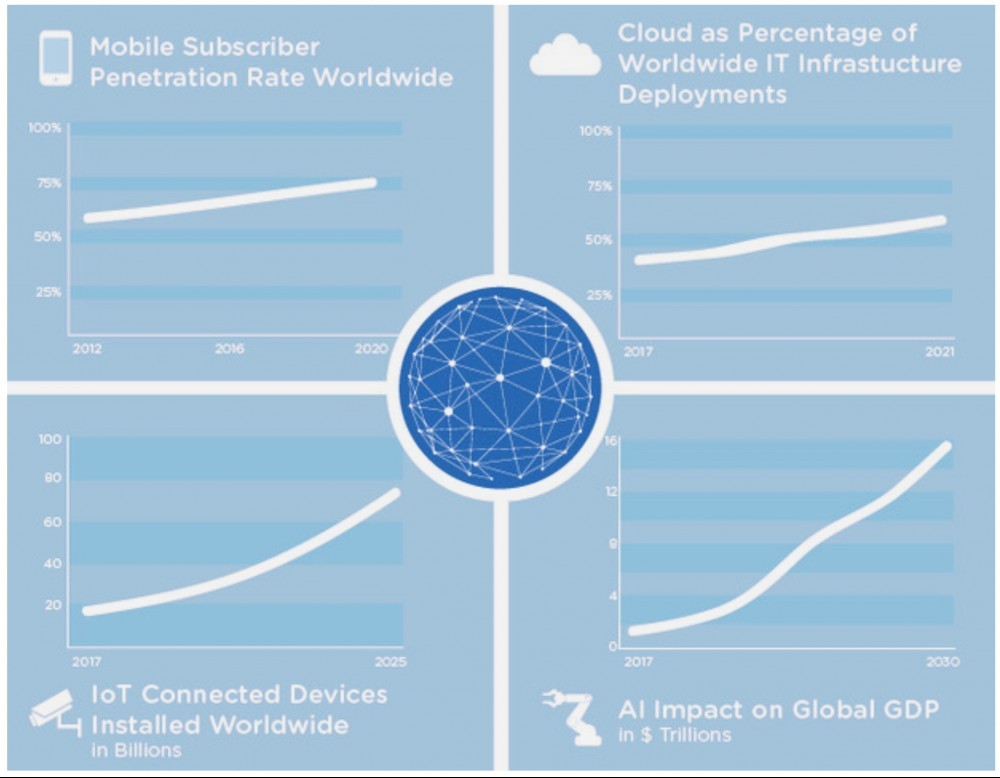 Mobile technology
Mobile technology- The Cloud
- Deep-learning AI
- The internet of things (IoT)
These four things are trending upward very fast, and there appears no sign of them stopping anytime soon. For more specifics on each one, see THIS ARTICLE.
So the question is, in light of this truth, how can we leverage these things for our own benefit, for the benefit of our families, and, of course, for the benefit of relieving our G.A.S.-y love for music gear whenever it might strike?
I was asking the same questions last year, when it became clear that album releases these days generates close to zero in sales for all but the biggest stars. Even hugely popular albums or songs earn very little, due to the command of streaming sites in the music industry now and, if we call a spade a spade, their concomitant greed.
Once, we had an ongoing income stream via the continued sales of our albums. That’s gone. The only game in town is now streaming music, and, unless further litigation forces their hand, they’re going to continue to share only a pittance of their earnings with the actual makers of the music.
Ahhh, but about this: developing your own online website… as a business?!
Let’s Make You… Digital TOO!
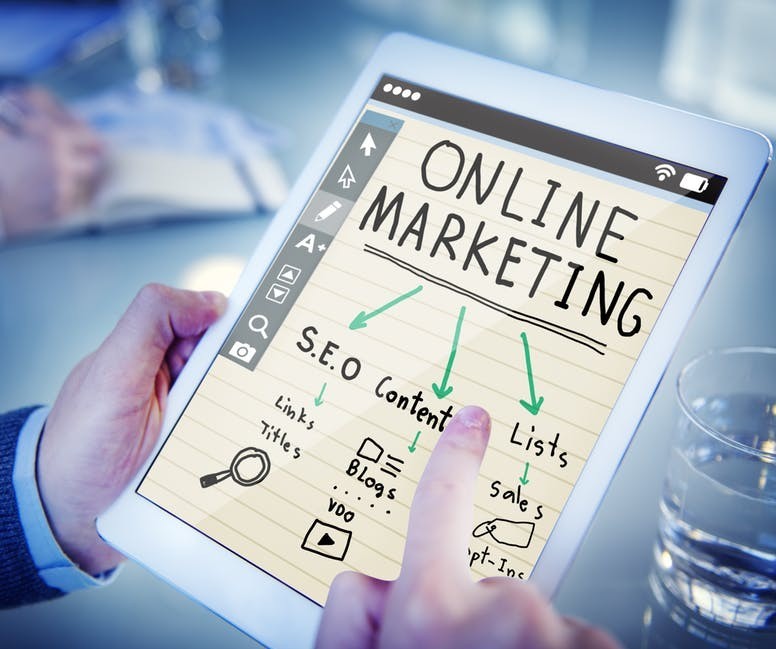
Last year I looked at the business and knew that the approaches of the past were no longer valid. If I was to be successful with my next album, I’d have to do something outside the box. Outside the “streaming” box, especially.
As I researched over the course of months, I noticed that there was a small core of relatively unknown musicians who were nonetheless succeeding financially, BIG TIME, by leveraging the power of the Internet.
The more I studied, the more clear it became: in this day and age, to truly forge your own successful path in music, you had to partner with the Web, ongoingly work your own website, and market either your own product or other company’s products via your site.
Hundreds of entrepreneurial, hard-working musicians around the globe are doing just that… right now! And making six figures from their efforts!!
So it was clear to me… if they can do it, then I CAN.
Moreover, as an extension of that – YOU can.
All it will take is a simple paradigm shift: change your thinking from:
“I have a website”
To:
“I am running an online business.”
That’s really what will make the difference. Once you’ve set that thinking as your foundation, the implementation strategies and presentation options are just little work hurdles to jump over.
Thousand all over the globe are leveraging their sites for long-term success, and finding it works. I started last year and am amazed at the results. I love what I do, and have already seen how “worth it” it can be when your own efforts are monetized and your own passions are shared.
It’ll take a few months before you see any huge results, but if you set it up right, and look at your site like a business rather than just a photo book for your concerts, it will grow and grow if you put even a modicum of effort into it a few times weekly.
In the End… Your Music’s Worth It!
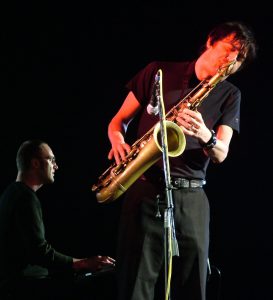
In light of all we’ve learned about digital music and digital music creation, it’s clear we must create our own launch platforms and opportunities instead of waiting for some big break from the audio sky to summon us to stardom.
In fact, labels expect these days is that you’ve already developed a grass-roots following using all the major social media outlets, and that you have your own website and community/touring presence before they even take you seriously.
Assemble your own entertaining website with these things in mind, and link up with the right interlocking parts from a reputable online provider. Slowly but surely, it will substantiate into your personal vision of monetary and artistic success.
Go ahead. It can’t hurt to try it!
We musicians have put a lot of time into honing our craft – sometimes decades. But it’s important that we be just as skilled at navigating how our industry changes. These days, we must look the changes square in the eye and dare them to keep us down!
It’s time. Time to think creatively instead of relying on models that once worked but are now defunct. Time to change our methods of monetizing, so we can ongoingly remain financially successful with our music.
If you have any questions, or comments, please… leave them below. We love hearing from you. And I really personally enjoy sharing the insights I’ve gained from the success of this website with those who are kind of lost and wondering, “What do I do in the face of all this industry change??!”
For now tho’, as usual, don’t neglect the joy of playing those instruments and that gear, and use them all to…
… go… make… sounds!!
Teaj
Yea, Nadia, it’s really unbelievable, the ‘streaming stealing’ that’s prevalent today. I mean, an artist could potentially have THOUSANDS of plays on Spotify, and still not have enough gas money to get to the next gig. ASCAP and BMI have been working to try to rectify the situation and get them to cough up some more. So far, not much success.
I found you on Spotify. Looks like you’ve got a lot of Yoga playlists. I’ll use one next time I yoga out! 😉
Thank you for all the great info, esp on Spotify. I had no idea that spotify paid so little to the artists, because I have discovered so many new artists on it. Thank you for all the new information. What is your band name? Since your a fellow spotify user, look me up online NadiaElisian. Thanks!